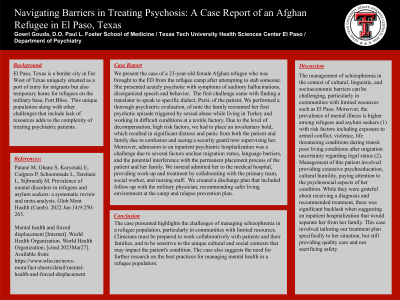Diversity, Equity, and Inclusion
Session: Poster Session
(068) Navigating Barriers in Treating Psychosis: A Case Report of an Afghan Refugee in El Paso, Texas

Trainee Involvement: Yes

Gowri Gouda, DO
Physician Resident
Texas Tech University of Health Science Center- El Paso
El Paso, Texas, United States
Presenting Author(s)
Patanè M, Ghane S, Karyotaki E, Cuijpers P, Schoonmade L, Tarsitani L, Sijbrandij M. Prevalence of mental disorders in refugees and asylum seekers: a systematic review and meta-analysis. Glob Ment Health (Camb). 2022 Jun 14;9:250-263. World Health Organization. Mental health and forced displacement [Internet]. World Health Organization; 2018 [cited 2023 Mar 30]. Available from: https://www.who.int/news-room/fact-sheets/detail/mental-health-and-forced-displacement.
Background: El Paso is a border city in west Texas uniquely situated as a port of entry for migrants but also temporary home for refugees on the military base, Fort Bliss. This disadvantaged population face many challenges, which adds to the complexity of treating them for psychiatric illnesses.
Case: We present the case of a 23-year-old female Afghan refugee who was brought to the hospital from the refugee camp after attempting to stab someone. She presented acutely psychotic with symptoms including auditory hallucinations, disorganized speech and behavior. The first challenge came with finding a translator to speak in her dialect, Parsi. During our evaluation, her family recounted her first psychotic episode that was triggered by sexual abuse while living in Turkey and working in difficult conditions at a textile factory. Due to the level of decompensation and high risk factors, we placed an involuntary hold. There was significant distress and panic from the patient and family due to confusion and perceived threat from the security guard now supervising her. Moreover, admission to an inpatient psychiatric hospitalization was a challenge due to several factors such as unclear migration status, language barriers, and potential interference with the permanent placement process. We instead admitted her to the medical hospital, providing work-up and treatment by collaborating with the military personnel, primary team, social worker, and the nursing staff. We created a discharge plan that included follow-up with the military physician, recommending a safer living environment and a relapse prevention plan.
Discussion: The management of mental illness in the context of cultural, linguistic, and socioeconomic barriers can be challenging, particularly in communities with limited resources such as El Paso. Moreover, the prevalence of mental illness is higher among refugees and asylum seekers (Patanè, 2022) with risk factors that include exposure to armed conflict, life-threatening conditions during transit, poor living conditions after migration and uncertainty regarding legal status (World Health Organization, 2021). Management of this patient involved providing extensive psychoeducation, cultural humility and paying attention to the psychosocial aspects of her condition. This case involved tailoring our treatment plan specifically to her situation, but still providing quality care without compromising safety.
Conclusion: The case presented highlights the challenges of managing mental illness in a refugee population, particularly in communities with limited resources. Clinicians must be prepared to work collaboratively with patients and their families, and to be sensitive to the unique cultural and social contexts that may impact the patient's condition. The case also suggests the need for further research on the best practices for managing mental health in a refugee population.
References:

